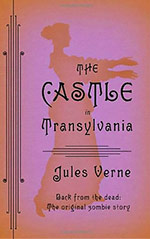
![]() charlesdee
charlesdee
10/9/2016
![]()
I read the half dozen or so standard Jules Verne novels as an adolescent and returned to a few of them as an adult; but, I've always been curious about the breadth of his work and tempted by the recent, "true to the original" translations that have begun to appear. The Castle in Transylvania was a title new to me when I picked up this secondhand copy of the Melville House edition.
In 1992--late in his career--Verne, who had dabbled in so many genres, decided to try his hand at a Gothic novel. He brought his scientific interests to its resolution, but all the Gothic paraphernalia is in place. His original title was The Castle in the Carpathians, and the switch to Transylvania for this edition is an unneeded nod to Dracula. (It is suggested that Bram Stoker might have encountered Verne's work and chosen the setting for his own, but as they say on Wikipedia, "citation needed.") The setting is wild and remote. A mouldering castle sits high above a small town populated by a few pretentious bourgeois, many superstitious peasants, one brave woodsman, and a Jewish innkeeper. (Verne's anti-Semitism is in full force, but we are spared another of his stock characters: the servant whose excellence is defined by his devotion to a master for whom he is willing to die.) The castle has been deserted for years but now smoke is seen rising from its chimneys. Clearly devils have taken it over. A comic pairing of our intrepid woodsman and a boastful but cowardly doctor set out to investigate.
When Verne switches to his back story, we get two sheltered aristocrats from the boonies of Eastern Europe who are both besotted by love for a beautiful opera singer. One of these men is considerably more sinister than the other, but their story brings them both to this small Carpathian town. Years of familiarity with the plot developments of the sorts of B pictures Boris Karloff made in the 1940's spoils most of the surprises Verne's scientific elements bring to the climax, but his storytelling is excellent and entertaining throughout.
Thanks go to Melville House for unearthing and reintroducing this short novel to contemporary readers.